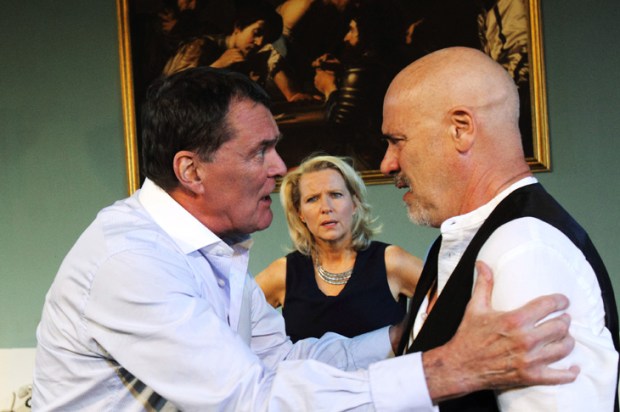One of David Bowie’s last works, Lazarus, is a musical based on Walter Tevis’s novel The Man Who Fell to Earth. Enda Walsh has written the script. The lead character, Newton, is a derelict celebrity addicted to gin who occupies a big brown apartment full of bickering attendants. It’s unclear who or what Newton is. Human or alien? Something in between? His ontological status is a further puzzle. He may be alive, dead, half-dead, non-dead, half-undead or semi-not-quite-half-unalive. This is a problem, dramatically. A character who exists outside the mortal realm can’t make choices or perform actions that affect himself and others. He’s not a personality, therefore, just a puzzle wearing some clothes. Beige clothes in this case.
Newton’s light-brown shirt and fawn trousers match his fudge-y make-up. The playing area, also beige, is arranged in rectilinear blocks like a bookless municipal library. A glass wall at the rear of the stage reveals a lugubrious band of musicians who churn out Bowie’s magnificent back catalogue without a trace of passion or involvement. These visual and spatial effects are cooling, distancing. The emotional register is frozen reverence. The plot dodges here and there, never settling on anything for long, as Newton’s employees pootle around the place, whining. A black-clad helper announces that he’s gay and dies. A foxy maid and her clingy boyfriend exchange petulant gripes and accusations of infidelity. A scene of bloodshed in a nightclub darkens the mood temporarily.
Then a sexy sprite appears. She creates a low-budget Mars probe by sticking some tape on the floor in the form of a winged cone. Newton climbs into this imaginary rocket, and his trip to the red planet, perhaps also imaginary, begins. Somebody persuades Newton to stab the sprite with a penknife. He hesitates. In a normal play this would be tense and gripping but here the would-be killer and his potential victim are ethereal spectres so the result of the knifework is impossible to guess at. Newton wields the blade, the sprite falls flat on her back, turns into milk, gets up again and announces that she has a new name. The foregoing sentence, I’m sorry to say, describes the most coherent narrative passage in the show.
Box-office business seems healthy enough and the Bowie fans, many now qualifying for free bus travel, watched the show in motionless silence. Was that ennui or medical advice? ‘Don’t overdo it, dear.’ The music itself outstrips everything. Michael C. Hall (Newton) gives a vocal performance that ascends gloriously to the level required. As an actor he’s over-demonstrative but his voice is transfixing, like Bowie’s, intimate and vast, full of weird shadings and colorations, haunted by pain and need. It’s always a treat to hum along to classic tracks like ‘Heroes’ and ‘Changes’ being thrashed out at top volume. But let’s be honest about this. In its heyday, rock music was played over-loud as an act of defiance. Now it’s an act of prudence. The curved-spine community can’t hear a thing unless the amps are cranked up to 11.
Ade Edmondson was part of a comedy duo that famously lacked a straight man. Pop-eyed maniac Rik Mayall played everything at breakneck speed. And Edmondson, to match his friend’s inspired lunacy, assumed the role of a ranting goblin whose zaniness never fully convinced. Behind the braying vocalisations and the distorted grimaces lay something softer and more humane, a genial intelligence, a quiet thoughtful figure embarrassed, perhaps, by the posturing caricature he’d been forced to create.
The true Edmondson emerges in William Leith’s sad-dad memoir, Bits of Me Are Falling Apart. Edmondson is a wry, unshowy, presence who brings warmth and likeability to Leith’s troubled persona. He ruminates on life’s disappointments as he makes his weekly journey across London to fetch his son from his estranged partner. Self-pity is a lure he can’t resist. Though a successful writer, he regards himself as a failure. In perfect health, he’s convinced that lethal ailments are about to budge him into the boneyard. Securely housed, he regrets not scrambling on to the property ladder earlier. And he insists that his little lad, aged two, is the only source of comfort in his life. This is false, of course, as he probably realises. He derives far more pleasure from the relentless contemplation of his own shortcomings. What he forgets is that he’s exceptionally fortunate, in his mid-50s, to be fit, intelligent, solvent, fertile, available romantically and therefore capable of starting afresh. As his son grows into boyhood he will start to view his distant but loving father as a figure of romance and glamour. Steve Marmion has added some colourful flourishes to the script but the material is devoid of theatricality. It would work better on radio. And best of all in book form. Which is where it began.
Got something to add? Join the discussion and comment below.
Get 10 issues for just $10
Subscribe to The Spectator Australia today for the next 10 magazine issues, plus full online access, for just $10.














Comments
Don't miss out
Join the conversation with other Spectator Australia readers. Subscribe to leave a comment.
SUBSCRIBEAlready a subscriber? Log in